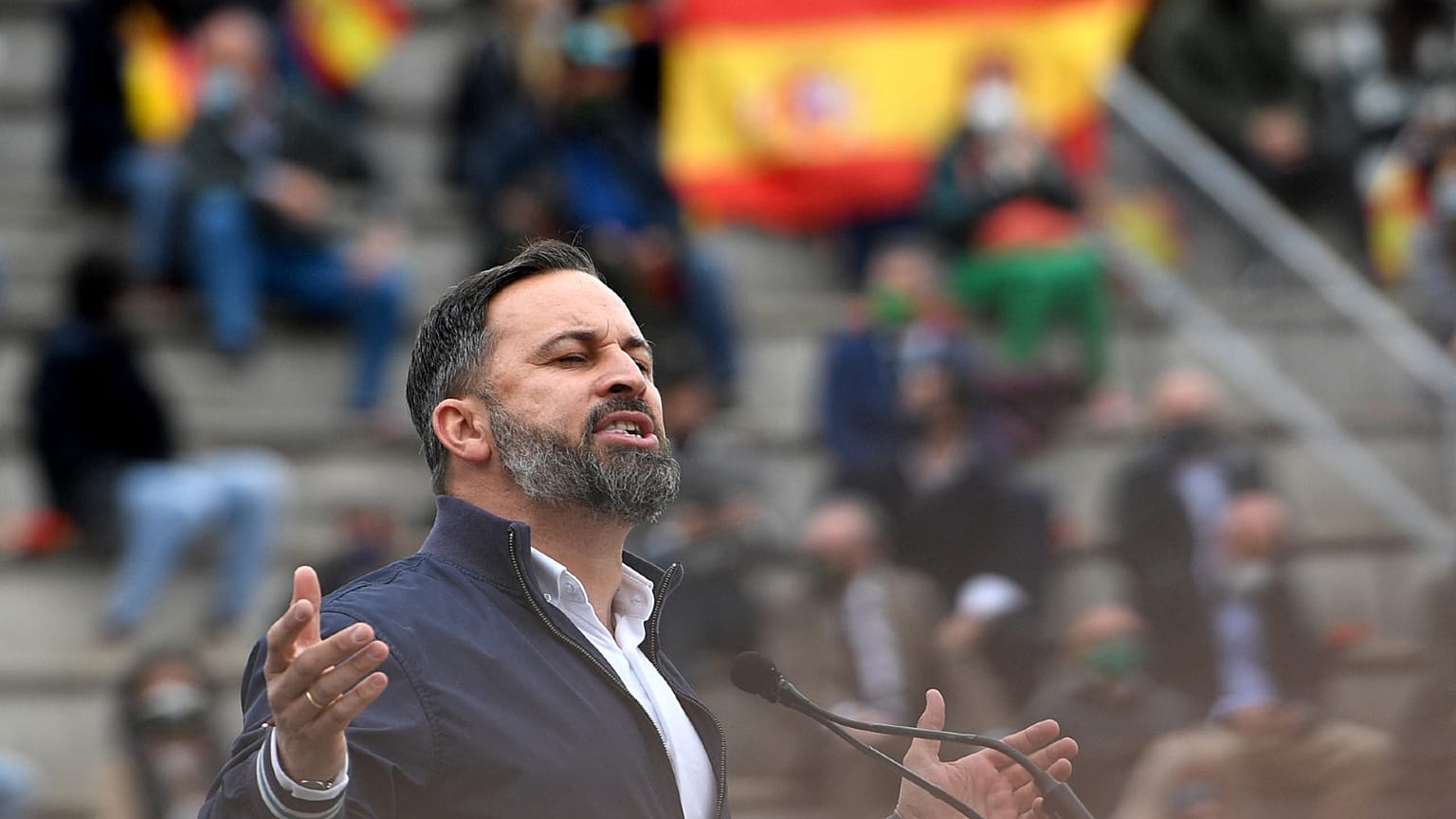According to recent polls, the party could win ten seats in regional elections next month and get into power by joining a governing coalition.
Stirring patriotic music fills a city square in Valladolid, where around a thousand Spaniards are gathered, chanting "long live Spain!".
The meeting’s fervour grows as Santiago Abascal, leader of Spain’s far-right party Vox, makes his way to the podium in Valladolid, the capital of the north-west Castilla y León region.
He’s arrived fresh off his motorbike to present the party’s candidate for upcoming regional elections on 13 February.
Abascal captivates his audience over the next hour. From levels of meat consumption to climate change, he covers all the bases and the crowd roars with approval.
Who is Spain's Vox Party?
Vox is Spain’s third political force but now appears to be on an upward trajectory regionally and nationally.
According to recent polls, the party could win ten seats in Castilla y León compared to just one in the last regional election in May 2019.
Nationally, it could capture as much as 20.5% of the vote -- up from 10.3% in 2019 -- according to the Electomania poll published on 16 January 2022.
The next election is due before 10 December next year.
Founded in 2013, it won 24 seats in its debut campaign in April 2019, increasing that to 52 at fresh elections in November of that year.
A first candidate in government?
In Valladolid, Abascal is introducing 30-year-old lawyer Juan García-Gallardo who could be the first Vox candidate to actually enter government -- albeit a regional one -- in a coalition with the conservative Popular Party (PP).
Vox leader Abascal defended García-Gallardo to the crowd, blaming the media for focusing on the candidate’s decade-old Twitter history.
García-Gallardo recently deleted tweets calling to “heterosexualise” sports and calling women “ridiculous” for demanding equal treatment.
But Abascal paints him as a family man who has his country’s interests at heart. His supporters appear to agree.
“What man in this world hasn’t talked about women like that or thrown about the term ‘queer’?” says financier and Vox supporter Alejandro, who prefers not to reveal his full name –- not, he adds, because he is ashamed of his convictions but simply because it is better for business.
“Everything Vox says is represented in the wrong way,” he explains.
Like Alejandro, many Vox supporters used to back PP. Seventy-six per cent of the party’s supporters are also male.
A polarising message
One of the party’s main issues is its representation in the media, with Abascal describing supporters as victims, telling the crowd that if they defend their country they’re called a fascist, or if they defend their borders, a racist.
Spain is also a victim, in the party’s view.
“Spain is under attack from illegal immigration,” Vox vice-president Jorge Buxadé tells Euronews.
“The situation is very serious; we are importing acts of violence and delinquency. There is delinquency connected to the traffickers and other kinds of delinquency that didn’t previously exist in Spain, like the sexual assaults on women carried out by gangs.”
Buxadé accuses the media of refusing to report on crimes by immigrants but at a press conference listed offences by North African immigrants with no mention of crimes by Spaniards.
Yet according to the country’s National Statistics Institute, Spanish nationals were responsible for 74% of all crimes committed in 2020 and 73.4% of sexual assaults.
Buxadé believes that “politics is polarisation” and that message has appeared to work for some in a country governed by a socialist coalition, and wrestling with the sixth wave of the pandemic, soaring energy prices, high youth unemployment, and concerning rates of inflation.
Could the party actually win in 2023?
Wins in Castilla y León in February and the Andalusia regional elections later this year could pave the way to the Moncloa Palace – the seat of national government – in 2023.
“We believe Spain is at the right moment to put Vox in the Spanish government with Santiago Abascal as president,” Buxadé tells Euronews.
Maverick Twitter personality, Luis “Alvise” Perez, 31, who is credited for influencing the landslide victory in the Madrid 2021 regional elections of PP candidate Isabel Díaz Ayuso, said that working-class voters are disappointed “that even a party as anti-establishment as Podemos [leftist populist party] hasn’t been able to change their circumstances. So, they’re going for the newest party.”
“When they see that any criticism of the left or any defence of a party like Vox causes outrage to the point of being criminalised, it becomes attractive,” the self-described political analyst says of younger support for Vox.
“Vox is seen as the victim. It has become cool and alternative for young people to support Vox because it is seen as a party outside the system that is actually coming to change things.”
Left-wing activist and author of The Bull by the Horns: Vox, The European Extreme Right and the Working Class Vote, Fidel Oliván Navarro, agrees that social media could account for at least some of Vox’s growing appeal across the board.
“It’s the only party that has changed its language on social networks,” he tells Euronews.
“The rest of the parties, perhaps Podemos to a lesser degree, use very institutional language to communicate. Vox’s departure from this could be pulling in some young voters.”
Fidel Oliván does not believe however that Vox is encroaching much on traditionally left-wing terrain: “they’re not the party of resistance,” he says.
“It would be hard for them to represent the struggle when they actually represent the establishment more than any of the other parties. They are not like the far right in France and Germany,” he adds. “The traditional right in other countries can’t stand the populist extreme right, but here the PP and Vox work very well together.”
Oliván is not convinced either by Vox’s efforts to attract the working-class vote with a workers union they have named Solidarity. “It’s a contra-union,” he says. “It defends the right not to strike.”
But Oliván does say that the 2011 left-wing anti-austerity movement, also known as 15/M, that grew into United Podemos has left those seeking an anti-establishment alternative high and dry.
“They promised something big to ordinary folk and then said, ‘Oh, well, that’s that. Let’s go home!’ Now there’s no one behind the wheel,” he says. “I think it was pretty irresponsible to stir up feelings against the system and not see it through.”
If a vacuum has been left, Vox is hurrying to fill it with claims of being different that are clearly proving persuasive and driving the party’s parallel reality, one in which climate change cannot be allowed to interfere with our daily lives:
“Of course, we have to protect the environment and natural resources,” Vox vice-president Buxadé tells Euronews. “But that can’t be done to the detriment of the human being and his economic activity.”
As neo-liberals who want to pare down the government, send home illegal immigrants and bolster livestock farming, do they really have a shot at the Moncloa?
“My only political forecast is that you can’t make a forecast,” says historian and extreme right specialist Xavier Casals. “But I don’t see them being in national power in 2023.”
Every weekday, Uncovering Europe brings you a European story that goes beyond the headlines. Download the Euronews app to get a daily alert for this and other breaking news notifications. It's available on Apple and Android devices.















